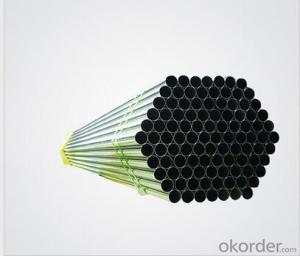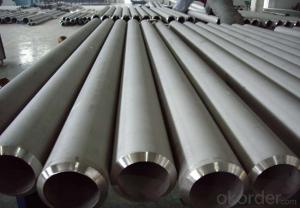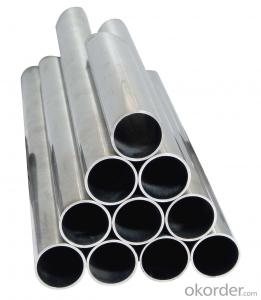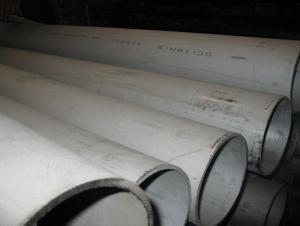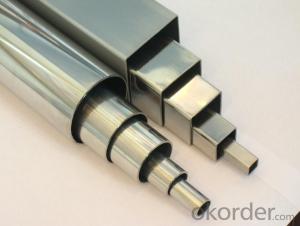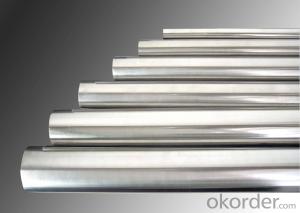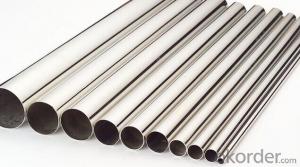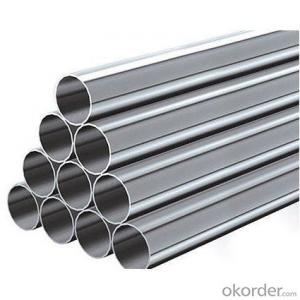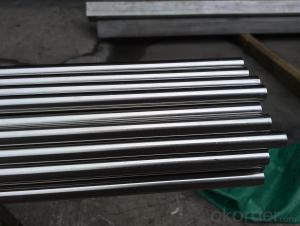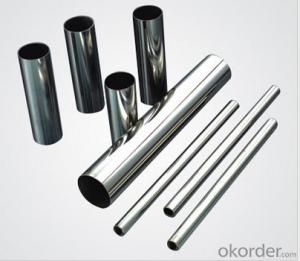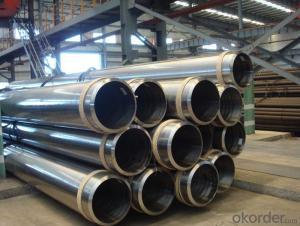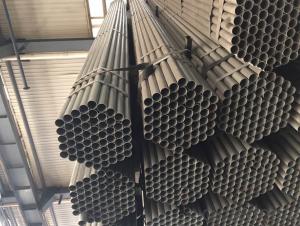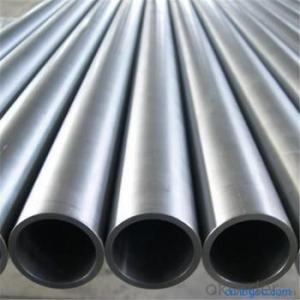High Quality Stainless Steel Pipes ASTM A249/A269; GB/T24593
- Loading Port:
- Ningbo
- Payment Terms:
- TT OR LC
- Min Order Qty:
- 25 m.t.
- Supply Capability:
- 5000 m.t./month
OKorder Service Pledge
OKorder Financial Service
You Might Also Like
1、Structure of Stainless Steel Welded Pipe ASTM A249/A269; GB/T24593:
Stainless steel Welded pipe is used in applications that require the pipe to have high anti-corrosive properties. Compared to steel and cast iron pipes, stainless steels are more flexible, durable and have a higher strength. They are very resistant to erosion-corrosion and can be formed and welded into various shapes and sizes. It is easily connected with various other piping systems and materials and is designed to withstand long life cycles.2、Main Features of Stainless Steel Welded Pipe ASTM A249/A269; GB/T24593:
• High manufacturing accuracy
• High strength
• Small inertia resistance
• Good visual effect
•Reasonable price
3、 Stainless Steel Welded Pipe ASTM A249/A269; GB/T24593 images:
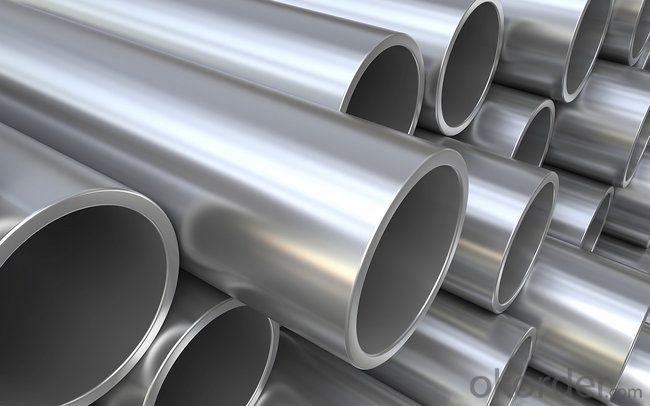

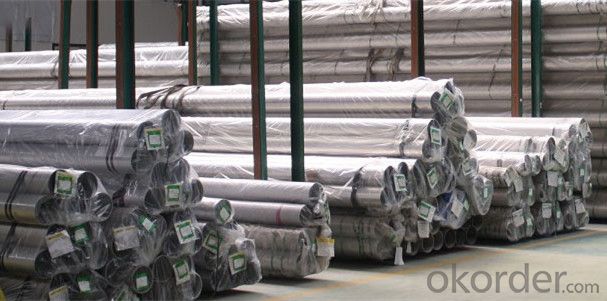
4、 Stainless Steel Welded Pipe ASTM A249/A269; GB/T24593 Specification:
Size:
| DN | OD | WT | ||||
| SCH 5S | SCH 10S | SCH 20S | SCH 40S | |||
| (A) | (B) | mm | mm | mm | mm | mm |
| 350 | 14' | 355.6 | 3.96 | 4.78 | 7.92 | 11.13 |
| 400 | 16' | 406.4 | 4.19 | 4.78 | 7.92 | 12.7 |
| 450 | 18' | 457.2 | 4.19 | 4.78 | 7.92 | 14.27 |
| 500 | 20' | 508.0 | 4.78 | 5.54 | 9.53 | 15.09 |
| 550 | 22' | 558.8 | 4.78 | 5.54 | 9.53 | 15.09 |
| 600 | 24' | 609.6 | 5.54 | 6.35 | 9.53 | 17.48 |
| 650 | 26' | 660.4 | 5.54 | 7.92 | 12.7 | 17.48 |
| 700 | 28' | 711.2 | 5.54 | 7.92 | 12.7 | 17.48 |
| 750 | 30' | 762.0 | 6.35 | 7.92 | 12.7 | 17.48 |
| 800 | 32' | 812.8 | 7.90 | 12.7 | 17.48 | |
| 850 | 34 | 863.6 | 7.92 | 12.7 | 17.48 | |
| 900 | 36' | 914.4 | 7.92 | 12.7 | 19.05 | |
| 1000 | 40' | 1016.0 | 9.53 | |||
| OD(mm) | WT(mm) | |||||||||||||
| 0.5 | 0.6 | 0.7 | 0.8 | 0.9 | 1 | 1.2 | 1.5 | 2 | 2.5 | 3 | 4 | 5 | ||
| 9.5 | ||||||||||||||
| 12 | ||||||||||||||
| 1/2' | 12.7 | |||||||||||||
| 13 | ||||||||||||||
| 14 | ||||||||||||||
| 5/8' | 15.9 | |||||||||||||
| 3/4' | 19.1 | |||||||||||||
| 7/8' | 22.2 | |||||||||||||
| 1' | 25.4 | |||||||||||||
| 1-1/8' | 28.6 | |||||||||||||
| 1-1/4' | 31.8 | |||||||||||||
| 1-1/2' | 38.1 | |||||||||||||
| 40 | ||||||||||||||
| 45 | ||||||||||||||
| 2' | 50.8 | |||||||||||||
| 52 | ||||||||||||||
| 2-1/4' | 57.15 | |||||||||||||
| 2-3/8' | 60.3 | |||||||||||||
| 2-1/2' | 63.5 | |||||||||||||
| 70 | ||||||||||||||
| 3' | 76.2 | |||||||||||||
| 85 | ||||||||||||||
| 3-1/2' | 88.9 | |||||||||||||
| 4' | 101.6 | |||||||||||||
| 4-1/8' | 104.78 | |||||||||||||
| 4-1/4' | 107.95 | |||||||||||||
| 4-1/2' | 114.3 | |||||||||||||
| 5-1/4' | 133.35 | |||||||||||||
| 6-1/4' | 158.75 | |||||||||||||
| 8-5/8' | 219.08 | |||||||||||||
ASTM A249 tolerance:
| OD | WT | Length | |
| <25.40mm | ±0.10mm | ±10.00% | OD<50.8mm +3.0mm -0mm OD≥50.8mm +5.0 -0mm |
| ≥25.4mm~38.1mm | ±0.15mm | ||
| ≥38.1mm~50.8mm | ±0.20mm | ||
| ≥50.8mm~63.5mm | ±0.25mm | ||
| ≥63.5mm~76.2mm | ±0.30mm | ||
| ≥76.2mm~101.6mm | ±0.38mm | ||
| ≥101.6mm~190.5mm | +0.38mm -0.64mm | ||
| ≥190.5mm~228.6mm | +0.38mm -1.14mm | ||
ASTM A269 tolerance:
| OD | WT | Length | |
| <38.1mm | ±0.13mm | OD<12.7mm ±15% OD≥12.7mm ±10% | OD<38.1mm +3.20mm -0mm OD≥38.1mm +4.80 -0mm |
| ≥38.1mm~88.9mm | ±0.25mm | ||
| ≥88.9mm~139.7mm | ±0.38mm | ||
| ≥139.7mm~203.7mm | ±0.76mm | ||
| ≥203.7mm~304.8mm | ±1.01mm | ||
| ≥304.8mm~355.6mm | ±1.26mm | ||
5、FAQ of Stainless Steel Welded Pipe ASTM A249/A269; GB/T24593:
①How is the quality of your products?
Our products are manufactured strictly according to national and internaional standard, and we take a test on every pipe before delivered out. If you want see our quality certifications and all kinds of testing report, please just ask us for it.
Guaranteed: If products’ quality don’t accord to discription as we give or the promise before you place order, we promise 100% refund.
②How about price?
Yes, we are factory and be able to give you lowest price below market one, and we have a policy that “ for saving time and absolutely honest business attitude, we quote as lowest as possible for any customer, and discount can be given according to quantity”,if you like bargain and factory price is not low enough as you think, just don’t waste your time.Please trust the quotation we would give you, it is professional one.
③Why should you chose us?
Chose happens because of quality, then price, We can give you both.Additionally, we can also offer professional products inquiry, products knowledge train(for agents), smooth goods delivery, exellent customer solution proposals.Our service formula: good quality+good price+good service=customer’s trust
SGS test is available, customer inspection before shipping is welcome, third party inspection is no problem.
Any question, pls feel free to contact us !
- Q:How do you protect stainless steel pipes from internal corrosion?
- One effective way to protect stainless steel pipes from internal corrosion is by utilizing a corrosion inhibitor. Corrosion inhibitors are chemicals that can be added to the fluid flowing through the pipes to create a protective layer on the inner surface of the pipe. This layer acts as a barrier, preventing the corrosive agents in the fluid from coming into direct contact with the stainless steel. There are various types of corrosion inhibitors available, and the selection depends on the specific application and the fluid being transported. Some common corrosion inhibitors include organic inhibitors, which form a protective film on the pipe surface, and inorganic inhibitors, which react with the corrosive agents to form less harmful compounds. Another method to protect stainless steel pipes from internal corrosion is by using cathodic protection. Cathodic protection involves connecting the stainless steel pipe to a sacrificial anode made of a more reactive metal, such as zinc or aluminum. This creates a galvanic cell, where the anode corrodes instead of the stainless steel pipe. By sacrificing the anode, the pipe is effectively protected from internal corrosion. Regular maintenance and inspection are also crucial in preventing internal corrosion. It is essential to monitor the condition of the pipes, identify any signs of corrosion or damage, and promptly address any issues. Flushing the pipes with clean water or appropriate cleaning solutions can help remove any deposits or contaminants that could contribute to corrosion. Furthermore, maintaining proper fluid composition and pH levels is vital to prevent internal corrosion. In some cases, adjusting the fluid's pH or adding corrosion inhibitors specific to the fluid being transported can significantly reduce the risk of corrosion. Overall, a combination of corrosion inhibitors, cathodic protection, regular maintenance, and appropriate fluid management can effectively protect stainless steel pipes from internal corrosion, ensuring their longevity and optimal performance.
- Q:The difference between galvanized steel pipe and stainless steel pipe
- Cast iron pipes (Cast, Iron, Pipe), cast cast pipe. Cast iron pipes are used for water supply, drainage and gas transmission lines. They include cast iron pipes and pipe fittings. Labor intensity is small. According to the casting method, it is divided into continuous cast iron pipe and centrifugal cast iron pipe, in which the centrifugal cast iron pipe is divided into sand mould and metal type two kinds. Divided into gray cast iron pipe and nodular cast iron pipe according to different material. According to the interface form, it is divided into flexible interface, flange interface, self anchored interface, rigid interface and so on. Among them, the flexible iron pipes rubber sealing ring; flange interface cast iron pipe flange fixed in the rubber pad, the flange gasket sealing; rigid interface cast iron pipe socket is large, straight pipe is inserted, sealed with cement, this technology has been basically eliminated
- Q:What is the cost difference between stainless steel and other types of pipes?
- The cost difference between stainless steel pipes and other types of pipes can vary depending on several factors. Stainless steel pipes are generally higher in cost compared to other types of pipes such as PVC, copper, or galvanized steel. This is primarily due to the superior qualities and characteristics that stainless steel offers. Stainless steel is highly corrosion-resistant, which means it can withstand harsh environments and chemicals without deteriorating. This durability translates into a longer lifespan, reducing maintenance and replacement costs in the long run. Additionally, stainless steel is known for its strength and high temperature resistance, making it suitable for various applications, including industrial and sanitary purposes. On the other hand, other types of pipes like PVC or copper are typically cheaper in terms of upfront costs. However, they may have limitations in terms of durability, chemical resistance, and temperature tolerance. PVC pipes, for instance, may be prone to cracking or breaking under extreme temperatures or when exposed to certain chemicals. Copper pipes, while durable, can be more expensive than PVC but may still be less costly than stainless steel. Therefore, when considering the cost difference between stainless steel and other types of pipes, it is essential to take into account the long-term benefits and potential cost savings associated with stainless steel's superior performance and longevity. Ultimately, the specific application, required qualities, and budget constraints will determine the most cost-effective option for any given project or system.
- Q:Can stainless steel pipes be used for gas pipelines?
- Yes, stainless steel pipes can be used for gas pipelines. Stainless steel is highly resistant to corrosion and can withstand high pressure and temperature conditions, making it suitable for carrying gases safely and efficiently. Additionally, stainless steel pipes are durable and have a long lifespan, making them a reliable choice for gas transportation.
- Q:Stainless steel tube, also known as why tube?
- According to the end of the pipe can be divided into light pipe and wire tubeThe tube can be divided into ordinary tube and special thread tube
- Q:What is the difference between 304LN and 316LN stainless steel pipes?
- The main difference between 304LN and 316LN stainless steel pipes lies in their chemical composition and corrosion resistance properties. 304LN stainless steel pipes contain a higher percentage of chromium and nickel, making them more resistant to corrosion in general applications. On the other hand, 316LN stainless steel pipes have a higher content of molybdenum, which enhances their resistance to pitting and crevice corrosion, especially in chloride environments. Therefore, 316LN stainless steel pipes are often preferred in more corrosive and aggressive environments, such as marine or coastal applications, while 304LN stainless steel pipes are suitable for regular industrial and commercial use.
- Q:How do you prevent leakage in stainless steel pipes?
- To prevent leakage in stainless steel pipes, there are several measures that can be taken: 1. Proper installation: Ensure that the stainless steel pipes are installed correctly by trained professionals who have expertise in working with stainless steel. This includes using appropriate fittings, connectors, and seals to ensure a tight and secure connection. 2. Regular inspections: Conduct routine inspections to identify any signs of leakage such as corrosion, cracks, or loose fittings. This allows for proactive maintenance and repairs before a major leak occurs. 3. Use high-quality materials: Choose stainless steel pipes that are made from high-grade materials and comply with industry standards. Low-quality materials or substandard manufacturing can lead to weak spots and increased risk of leakage. 4. Proper sealing: Use effective sealing methods such as gaskets, o-rings, or thread sealants to create a tight seal between pipe joints. This prevents any potential leakage points where fluids or gases can escape. 5. Pressure testing: Conduct pressure tests on the stainless steel pipes to ensure their integrity before they are put into operation. This helps identify any weaknesses or leaks that may have occurred during installation. 6. Regular maintenance: Implement a regular maintenance schedule to inspect and maintain stainless steel pipes. This includes checking for signs of corrosion, replacing worn-out seals or gaskets, and tightening fittings as necessary. 7. Avoid over-tightening: While it is important to ensure a secure connection, over-tightening fittings can lead to stress and damage to the pipe, which can result in leaks. Follow the manufacturer's guidelines for proper tightening torque. 8. Proper pipe support: Ensure that stainless steel pipes are adequately supported and secured to prevent stress or movement that can cause leaks. This includes using appropriate hangers, clamps, or brackets suitable for stainless steel pipes. By following these preventive measures, the likelihood of leakage in stainless steel pipes can be greatly reduced, ensuring the long-term integrity and reliability of the piping system.
- Q:Can stainless steel pipes be used for gas distribution?
- Gas distribution can utilize stainless steel pipes since they are highly durable and resistant to corrosion. This material is suitable for various applications, including gas distribution systems, thanks to its excellent resistance against the damaging effects of gases and moisture. By using stainless steel pipes, the gas distribution network can maintain its integrity and ensure safety. Moreover, these pipes possess high tensile strength, enabling them to withstand the high pressure and temperature conditions often encountered in gas distribution. Furthermore, stainless steel is non-reactive and does not release harmful substances into the gas stream, which makes it a reliable option for transporting gases. In conclusion, stainless steel pipes are the preferred choice for gas distribution due to their durability, corrosion resistance, and adherence to high safety standards.
- Q:Stainless steel works. What saw can be sawed off?
- Large quantity resin grinding wheel cutter. A small number of saw blade saw frame quickly is also very labor-saving. Saw blade with fine teeth. The middle teeth and coarse teeth are not suitable, easy to clamp teeth broken teeth.
- Q:Are stainless steel pipes suitable for food processing applications?
- Yes, stainless steel pipes are highly suitable for food processing applications. This is because stainless steel is resistant to corrosion, easy to clean and sanitize, and does not react with food or alter its taste. Additionally, stainless steel pipes comply with hygiene and safety standards, making them ideal for the food industry.
1. Manufacturer Overview |
|
|---|---|
| Location | |
| Year Established | |
| Annual Output Value | |
| Main Markets | |
| Company Certifications | |
2. Manufacturer Certificates |
|
|---|---|
| a) Certification Name | |
| Range | |
| Reference | |
| Validity Period | |
3. Manufacturer Capability |
|
|---|---|
| a)Trade Capacity | |
| Nearest Port | |
| Export Percentage | |
| No.of Employees in Trade Department | |
| Language Spoken: | |
| b)Factory Information | |
| Factory Size: | |
| No. of Production Lines | |
| Contract Manufacturing | |
| Product Price Range | |
Send your message to us
High Quality Stainless Steel Pipes ASTM A249/A269; GB/T24593
- Loading Port:
- Ningbo
- Payment Terms:
- TT OR LC
- Min Order Qty:
- 25 m.t.
- Supply Capability:
- 5000 m.t./month
OKorder Service Pledge
OKorder Financial Service
Similar products
Hot products
Hot Searches
Related keywords
